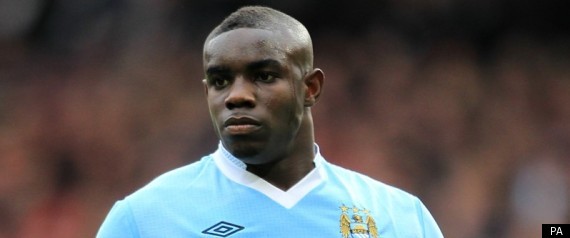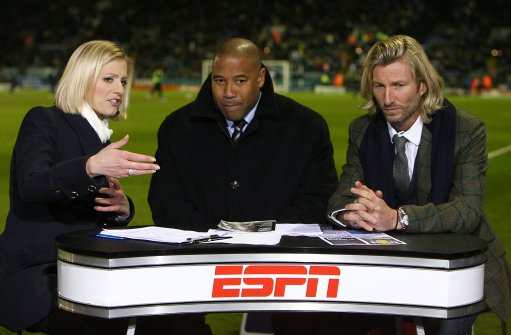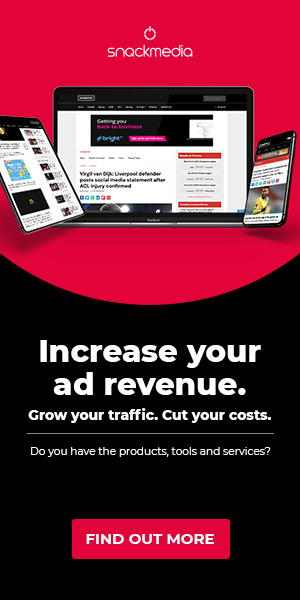Football, Racism and Twitter
Last week long-time Twitter fan and Manchester City defender Micah Richards quit the social media platform after becoming a target of racist abuse over the last few months.
He has not been alone in being subjected to such abuse. Fellow Premier League players Djibril Cisse, Louis Saha and Frazier Campbell, as well as football pundit Stan Collymore, have seen their fair share.
For me, it brings to the fore some important issues. I’ve long been campaigner for the bringing of sports stars onto platforms such as Twitter, giving them the chance to interact with fans, build up their profiles, show their real personality, have a voice and make themselves more accessible to the general public. But it’s not all a bed of roses.
Nowadays Twitter is everywhere. It is quoted in the newspapers and on SkySports News. Barely a day goes by without a mention of someone’s tweets; good or bad, dull or interesting. Sports stars have every journalist worth their salt following them, which in turn sanitises what they would truly want to say in the first place (unless it’s Joey Barton).
The other thing this does is make it very easy for anyone to find them and speak to them directly. After all, that is the purpose of social media isn’t it? Freedom of speech and openness. This is how I managed to put together this article. Would I have been able to bring together quotes from a player, Comms Director and lawyer in such a short period of time a few years ago? I doubt it.
But this availability has drawbacks. It attracts those who want to voice their opinion or try to bring about a response by subjecting the recipient to vile abuse. Yes, you can block and report people but if someone is persistent and knowledgeable enough there is always a way round it. But is quitting the platform the answer?
 Former Tottenham, Wolves and Shamrock Rovers player Rohan Ricketts thinks it’s not. He has used Twitter to its maximum and it has helped him in various ventures including a media career, creation of an online magazine (Column 10 – which is a great read btw) and writing regular columns for Sabotage Times and Fan590. His character certainly comes across well and he has embraced both it and his fans fans, to whom he speaks regularly.
Former Tottenham, Wolves and Shamrock Rovers player Rohan Ricketts thinks it’s not. He has used Twitter to its maximum and it has helped him in various ventures including a media career, creation of an online magazine (Column 10 – which is a great read btw) and writing regular columns for Sabotage Times and Fan590. His character certainly comes across well and he has embraced both it and his fans fans, to whom he speaks regularly.
“I wouldn’t have come off Twitter as Micah did. When you put yourself in public eye then you open yourself up to people to take shots at you. It comes in exchange for being famous. You need to understand that when you start on twitter it’s not going to be rosy always. You’re always going get abuse, even from your own fans. My favourite saying is that ‘elephants don’t swat flies’ and this applies to Twitter as well.”
The last few months have seen racism come to our attention both on the pitch and off it. Everyone knows about the Terry and Suarez cases and their repercussions, so I won’t get into those incidents anymore. But the question will be asked; are these global footballing role models influencing fans behavior or is twitter just highlighting a problem that is prevalent in our society?
Players are used to hearing some vile things being shouted at them on a Saturday afternoon from the stands. It comes with the territory. They are taught to blank it out and not react to it. It seems that with social media some of the ‘fans’ have taken to using this same attitude towards players, especially opposition ones.
Stan Collymore has taken to retweeting some of the worst abuse he receives. It’s a way of ‘naming and shaming’ those perpetrators in the hope of stopping them in their tracks whilst at the same time highlighting the issue to their other followers.
Ben Thompson, Media and Comms Director at PR agency Macesport, feels this is a positive approach to take;
“We decided very early on that as part of Robbie Savage‘s social media strategy that we would challenge people sending abuse or making false accusations and it had a remarkable effect. Retweeting some of the vile abuse that Robbie receives on a daily basis highlighted to his following some of the disgusting behaviour that people were willing to post on a public forum and in true social fashion they decided to join forces and stand up to it.
I think people forget that twitter is an open platform and it can be quite easy to trace. In one particular example Robbie’s followers found out details of an abuser and bombarded him with emails at work. The sheer numbers of outraged followers shutdown the IT system at the company where the offender was a Director and Robbie had to step in to make sure that he didn’t lose his job over the incident – all of which stemmed from one vile post.”
Other people will always have a different ideas as to how (and if) to respond to these haters. Rohan says that he just ignores those comments and doesn’t give them the time of day. “I don’t reply to them. Maybe one in thousand I reply to if sending abuse. They’re not out to have dialog with you, they may just be venting their opinions after a game or just want to get a response out of you. The chance to be associated with a player is something that happens. You send a tweet back and they say ‘I just got a reply from XYZ player!’.
People have to understand that twitter is just a social network and fans get carried away. It’s a space where people express themselves as vehemently as they do in the stands. Understanding this and that your not always going to receive positive messages is something that we have to accept.”
On the whole this works and much of it is water off a duck’s back. But when it comes to personal, vindictive and racist comments made over a period of time, there is only so much a person can take before asking themselves “is this really worth it?”
It is a tiny minority that send out these messages and they are usually done from anonymous accounts. As Ben says, there is other action that can be taken to deal with these people.
“Another way to deal with the abuse is to involve the platform provider.
Just the other day we received a vile post on Facebook and reported it straight away to Facebook. We also posted under the comment that we had informed Facebook and that this sort of behaviour wold not be tolerated. Within 5 minutes the posters account had been closed!
Some just disappear but others have also been turned from abuser to most ardent follower – Social Media gives the individual a direct line to the fans in a way that has never been possible before and it can be a powerful tool if harnessed correctly.”
There are other options when things become more serious, when the abuse becomes so personal and vile it cannot be ignored. So what legally can a player do? Sports lawyer Iain Taker has some answers;
“Where players experience racist abuse on platforms such as Twitter, there are potential avenues of protection open to them. The first, and most likely, would be to seek criminal proceedings by reporting the offence to the Police for offences such as harassment and public order offences e.g. causing people to fear harassment; these offences carry additional punishments where they are racial aggravated.
In addition a person who uses Twitter in a racially threatening, abusive or insulting manner could potentially be guilty of incitement to racial hatred. One significant advantage of pursuing criminal proceedings is the deterrent it has on potential future offenders as the consequences can be severe such as being fined or having a criminal record.
Not all cases brought to the Police will be prosecuted; the Police may seek in suitable circumstances to give offenders a final warning (as occurred with two youths who racially abused Sammy Ameobi of Newcastle FC on Twitter) under which any repeat offence would be prosecuted. A second area of protection revolves around making Twitter aware of the racial tweets. As the terms of service and use of Twitter prohibit abuse, notification to Twitter may result in the abusive user’s account being permanently suspended. If, however Twitter are made aware of racial comments from a user and fail to act then the player may be able to claim damages from Twitter directly.
This is because the defences (mere conduit and hosting defences) under the E-Commerce (EC Directive) Regulations 2002 would not be applicable where there has been adequate notification of the racial abuse. It may also be arguable that Twitter could owe the player a duty of care to avoid additional distress caused by the racial abuse, which could be breached if Twitter fails to remove abusive tweets quickly following notification about them.”
This may all sound very doom and gloom but it is not intended to be. It is a really sad state of affairs but for many players, athletes and celebrities the good things about twitter (and social media generally) outweigh the bad. Rio Ferdinand has found a voice that helps him not only build up his off-field work but also give opinions and reply to press articles, something players have never been able to do before. Robbie Savage, who we mentioned earlier, has developed a successful media career at a time when his playing days were coming to an end, and Twitter played no small part in getting him to where he is today.
What we need to look for are solutions. As social media advocates and ‘experts’ we will be the ones who others will look to for answers and comforting. We want to enhance those things that are good and reduce the things that are bad.
As always, love to hear your opinions on this emotive subject…
About author
You might also like
SPORTEL 2021: Day One Recap
This year’s prestigious SPORTEL convention kicked off in sunny Monaco today, welcoming a host of familiar faces as well as plenty of new ones. Doors opened at 8:30am with businesses
Six Founding Riders Set To Bring The Vision Of The UCI Track Champions League To Life
Olympic Champions, UCI World Champions and World Record holders join the new track cycling competition debuting in November 2021 The UCI Track Champions League is delighted to announce that six
Sports related spending to soar this summer as pre-pandemic life resumes
New insights from eBay Ads UK reveal the potential for brands to engage with an excited but nervous nation as sports events get back on track As pubs and indoor









